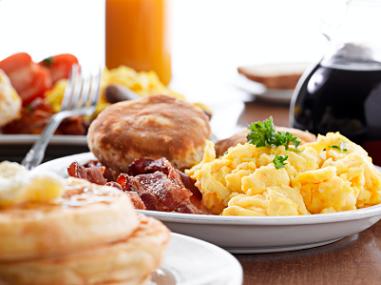 Eat Breakfast Every Day
Eat Breakfast Every Day
The world’s worst breakfast isn’t last night leftovers. It’s eating no breakfast at all. After 8 hours of sleep; your body is essentially in starving mode, which means your level of insulin and leptin (the fullness hormone) have dropped and your metabolism has slowed to a crawl. If you don’t wake up your body with food, your metabolism will stay sluggish all day long, even you will feel hungrier than normal! That’s a dangerous combination – and one that could show up on your waistline. A University of Massachusetts study found that people who regularly skip are 450 percent more likely to be obese.
I you load up on the right foods in the morning, you can enhance your weight lost. “Eating helps rev your metabolism, which starts your calorie burn,” says Susan Bowerman, MS, RD assistant director of the UCLA Center for Human Nutrition. In a Virginia Commonwealth University study, dieters who started their day with a protein-rich, high-calorie breakfast lost more weight over 8 months than those who only consumed 290 calories and a quarter of the protein. The big-breakfast eaters found it easier to adhere to their diet, even though both groups ate similar amounts of calories each day. So what makes the ideal morning meal? Heartiness – it should include protein, whole grains, and whole fruit, and a little dairy. Follow these rules to pull of the perfect breakfast:
A study of successful dieters found that 78 percent eat breakfast every single day! Commit to grabbing breakfast – even if it’s something small – every day. This is one habit that you don’t want to break.
Eliminate Excuses
The biggest reason skip breakfast: “I don’t have time.” So prove yourself that you do. This weekend, time how long it takes you to zap a bowl of instant meal and it. It’s most likely not long enough to make you late for work. Then remind yourself why it’s so important. “Not eating breakfast may reduce your metabolic by 10 percent,” says Leslie Bonci, RD, MPH, director of sports nutrition at the University of Pittsburgh Medical Center. If even instant oatmeal is pushing it, Keep a protein rich breakfast bar in your car, or prepare a yogurt-and-berries parfait the night before.
Ease Your Way In
If you’re a recent breakfast convert, you don’t have to dive it with a 500-calorie meal. But you do need a little something. So try drinking your calories: Start with a glass of milk, which gives you 8 grams of protein plus fat-burning calcium, or sip on a latte made with low-fat milk. If you can stomach solid foods grab a peace of whole-wheat toast topped with a slice of melted cheese. As your body becomes accustomed to morning feeding, you ban increase the size of your meal.
Divide And Conquer
Don’t have a stomach for a big breakfast? Try eating half of it when you first wake up, then eat the other half once you settle in at the office. Zap a packet of instant oatmeal with low-fat milk at home, then bring an apple or a banana to eat while you check your e-mails. This helps you frontload your calories – which can boost your satiety all day long – without giving you a bellyache.
Hurry To The Table
Sure, you’ve heard this advice before. But for good reason: If you sleep for 8 hours then delay breakfast, your body is essentially running on fumes by the time you make it to work. And that sends you desperately seeking sugar. Aim to eat breakfast within an hour of waking. The instant shot of energy – at least 300 calories’ worth – awakens your metabolism for the coming day. Plus, it keeps ghrelin, your appetite hormone, from kicking into gear.
Find Your Calories Range
Ideally, you’ll consume at least a quarter of your day’s calories at breakfast. For most people, this falls somewhere in the 350-to 500-calorie range. In fact, breakfast should be your largest meal of the day. Think about it: Your morning meal is fuel for the entire day, so packing in calories in the a.m. is the only strategy that makes sense.
Rise And Shine With Protein
Protein makes an appearance in almost every chapter of this book – and for good reason: It fills you up more effectively than other nutrients and takes your body more time to digest and absorb. Problem is, people consume 65 percent of their protein after 6:00 p.m., according to a University of Illinois study. That’s a big mistake: The researchers found that to preserve your muscle as you lose weight, you need to consume protein with every meal. “The most important diet upgrade for people who want to lose weight is to eat protein for breakfast,” says Louis Aronne, MD, director of the